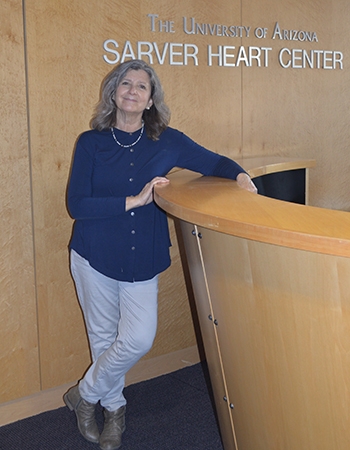The conversation with the Medicare consultant made me realize my job set me on a path to begin retirement in a healthier state than most. She asked me three times, “What prescriptions do you take?” And, each time I told her, “none, yet.”

These messages were reinforced by the enthusiastic support from the many volunteers who helped spread the word, particularly the Minority Outreach Committee members who taught me the pervasiveness of health inequities and the value of the church in African American communities; and the student volunteers who taught thousands of people life-saving skills through chest-compression-only CPR trainings.
Take Care of Your Health
If you’re reading this, you know the drill. Most likely you’ve joined me at community lectures and read health education information on Sarver Heart Center’s website, social media platforms and newsletters. Here’s my short list:
- Know your numbers
- Eat as close to plant-based as you can sustain
- Exercise
- Stay on top of preventative care
- Be your health advocate, especially if you’re a woman or a person of color
- Try to master these 10 things
- DON’T SMOKE!
About 10 years ago, my first Sarver Heart Center boss, Dr. Gordon Ewy, totally frustrated me when he declared, “It’s not a matter of IF you get heart disease, but WHEN you get it.” Well, I set out to show him. Yes, my mom had high blood pressure, atrial fibrillation, and died of heart failure. Yes, my dad battled high blood pressure and had carotid artery disease, although cancer claimed his life. But I took the heart health information, well, to heart, and applied as much as possible for health’s sake.
These things work! Given my family history, my cholesterol numbers are on the minds of my doctor and me. After I moved toward a Mediterranean, mostly plant-based diet and increased my cardio-exercise, my doctor flipped through my chart and asked me if she had put me on a statin since my last appointment. The cholesterol numbers declined that much with lifestyle changes, and a dose of good luck for now.
However, I also heed the sage wisdom of my current boss, Dr. Nancy Sweitzer: “As people age (and when women go through menopause), the majority of people develop hypertension, through effects of blood vessel stiffening with age, genetics and hormones. I find a lot of my patients see development of high blood pressure as evidence that they have in some way failed in their self-care, and I think we need to remove that stigma. If you live long enough, hypertension is a very common condition.”
Thank you, Dr. Sweitzer. I promise to continue tracking my health and will avoid being stubborn IF and WHEN my doctor says it’s time for some life-saving medications.
I’m grateful I had the opportunity to learn so much valuable information and share it with so many people. I wish you the best health you can muster in your own journey ahead. Do your best and don’t feel stigmatized. As another doctor said along the way, “If you have a condition that requires treatment, lifestyle changes make those therapies more effective.”

